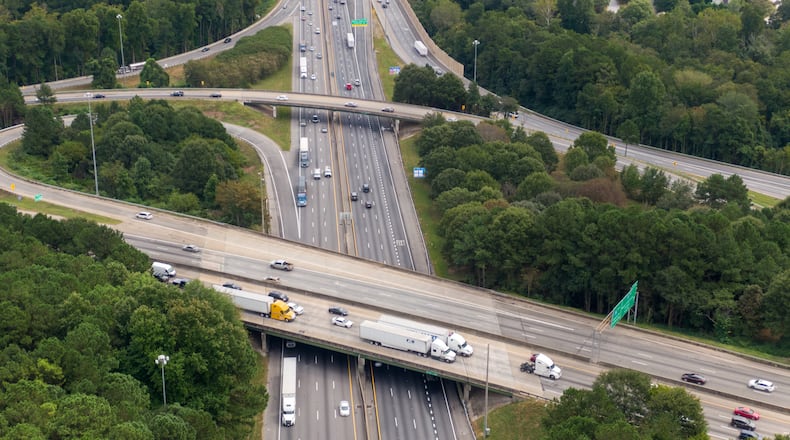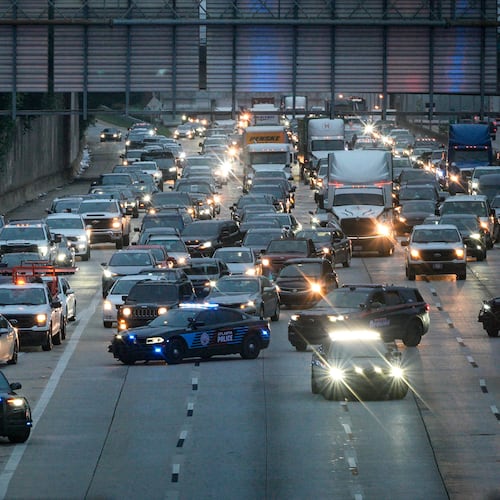Transportation just may be Atlanta’s biggest industry, a notion not defined by the amount of backups our city sees. The sheer amount of people that pass through the metro area’s arteries combines with flight volume at Hartsfield-Jackson and the flow of freight trucks and network of railroad tracks really make Atlanta a necessary nexus for southern travel.
All that said, there is little shock that our region has nine of the top 100 top freight bottlenecks in the United States. The American Transportation Research Institute compiles this list every year and uses tractor trailer GPS data to measure speeds, traffic volume and trip times nationwide.
The supply chain hiccups of the past couple of years bring even more attention to freight speeds. Measuring tractor trailer traffic patterns can also show how all traffic is behaving.
Georgia’s biggest freight bottleneck used to be the worst one in the nation. Spaghetti Junction — where I-85 and I-285 intersect in DeKalb County — measures as the fourth-worst interchange in the U.S. in 2021.
Trucks averaged just 30 mph during peak travel times in Spaghetti Junction last year and only 38.9 mph, overall. Peak travel time speeds in 2021 were almost 12% slower than in 2020 in that interchange, but were still 35% faster than before the pandemic in 2019. So the news there isn’t all bad.
The juncture of I-20 and I-285 in Fulton County is the nation’s fifth-slowest trucking bottleneck. Rush hour speeds there are only 2.4% better than they were in 2019, so the return to the “old normal” is almost complete on the west side.
Both of these infamous Metro Atlanta interchanges are due for re-profiling in the next 10 years, as part of a grander plan to add tolled Express Lanes to all of I-285 north of I-20.
I-75 in McDonough (#12), I-75 at I-285 in Cobb County (#14), GA-400 at I-285 in Sandy Springs (#18), and I-20 at I-285 in DeKalb (#21) all ranked very high on the list — or low, since gridlock is not exactly a positive goal.
Trucking speeds at peak times in McDonough on I-75 are actually almost 11% worse than they were in 2019, a testament to how much more freight surges in from the Port of Savannah.
On the flip side, I-75 in the Cobb Cloverleaf is moving trucks almost 45% faster during rush hour than it did before the pandemic. The 2018 opening of the Northwest Metro Express Lanes seems to be having a more positive effect on I-75 in Cobb than five-year-old toll lanes on the south side. The I-75 and I-675 merge in Stockbridge added to south metro woes with a #52 nationwide ranking and it also ran slower in 2021 versus 2019.
The better speeds through the Cumberland area may also be due to a larger residential populace that still does some pandemic-inspired telecommuting than in McDonough.
There have been proposals for truck-only lanes between McDonough and Macon, since big rigs make up such a large swath of the traffic on that I-75 corridor.
I-285 at GA-400 has been under reconstruction for several years, likely aiding in its bad ranking. That project is set to finish at the end of the year and should improve traffic-flow. And much like its west Atlanta counterpart, I-20 at I-285 on the east side is also set for a redesign in the next decade.
Tractor trailers are technically not allowed inside I-285, unless they have a delivery. But many motorists complain that the Department of Public Safety does not enforce that law enough. Regardless of the rule, I-20 at I-75/85 in Downtown Atlanta ranked #45 in the U.S. and I-75 at I-85 — the Brookwood Interchange in Midtown — scored #62.
Georgia’s nine trucking bottlenecks in the top 100 were tied with Tennessee for second-most in the U.S., trailing the whopping 14 in Texas on that dubious list. California only has eight and New York, six.
The I-95 at S.R. 4 interchange in Fort Lee, New Jersey ranks as the nation’s worst freight interchange, averaging only 30 mph daily and only 22 mph during rush hours.
Rush hour speeds there were almost even between 2019 and 2021.
Almost every junction on the list is the connection between two freeways. Two interstates merging or linking are much more likely to create friction than a normal interchange with a surface street. This further highlights why I-75 in Henry County is such a unicorn on this list and how much freight it carries.
Only 10 of the 100 worst U.S. freight interchanges saw rush hour speeds worse in 2021 than they were in 2019. As bad as traffic is, it still was worse before COVID-19.
Traffic lists only mean so much, but the indicators on this iteration show again how Atlanta is a vital transportation hub. They also remind us that small flanks at making our commute better - alternative transit, teleworking, and living near workplaces - do make differences. The fact that traffic is overall better now than before the pandemic is proof that these things can work. And keeping the roads moving is key to helping the currently clunky supply chain.
Doug Turnbull, the PM drive Skycopter anchor for Triple Team Traffic on 95.5 WSB, is the Gridlock Guy. He also hosts a traffic podcast with Smilin’ Mark McKay on wsbradio.com. Contact him at Doug.Turnbull@cmg.com.
About the Author
The Latest
Featured


